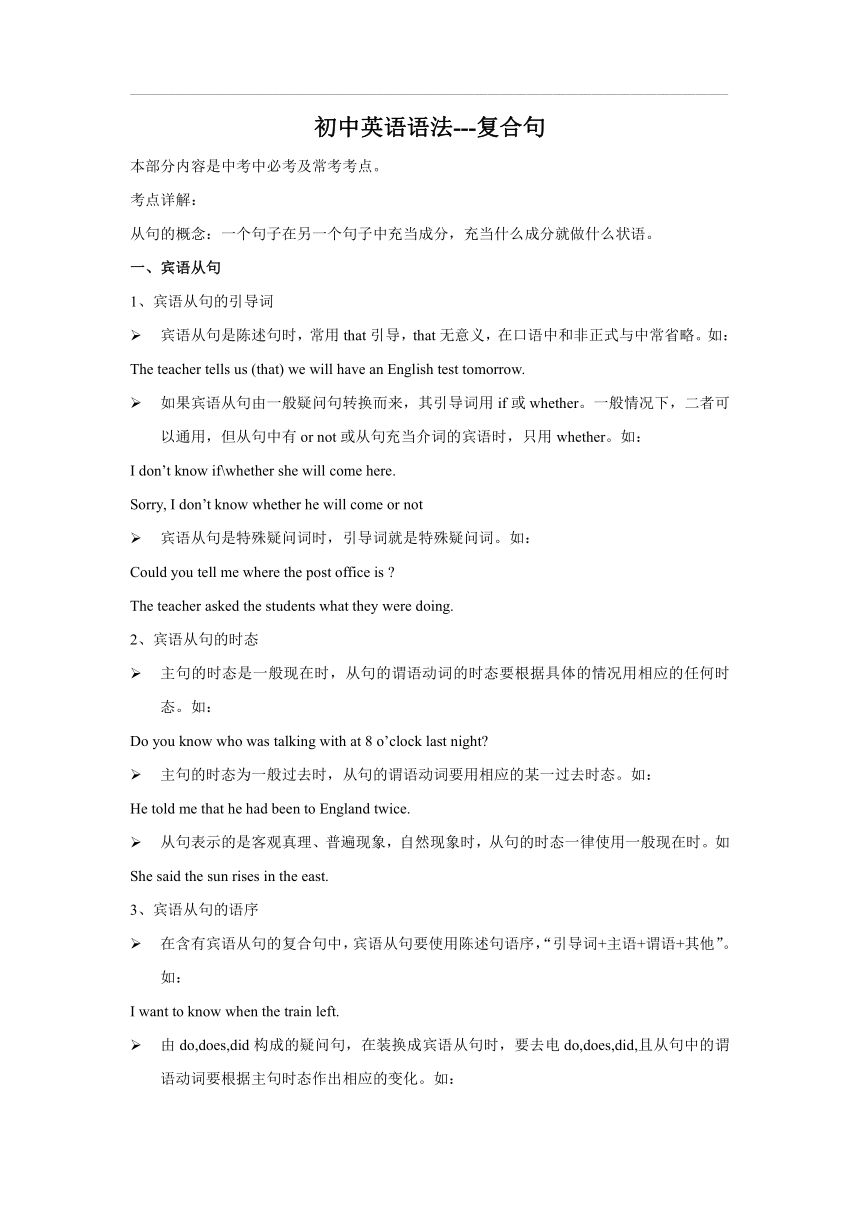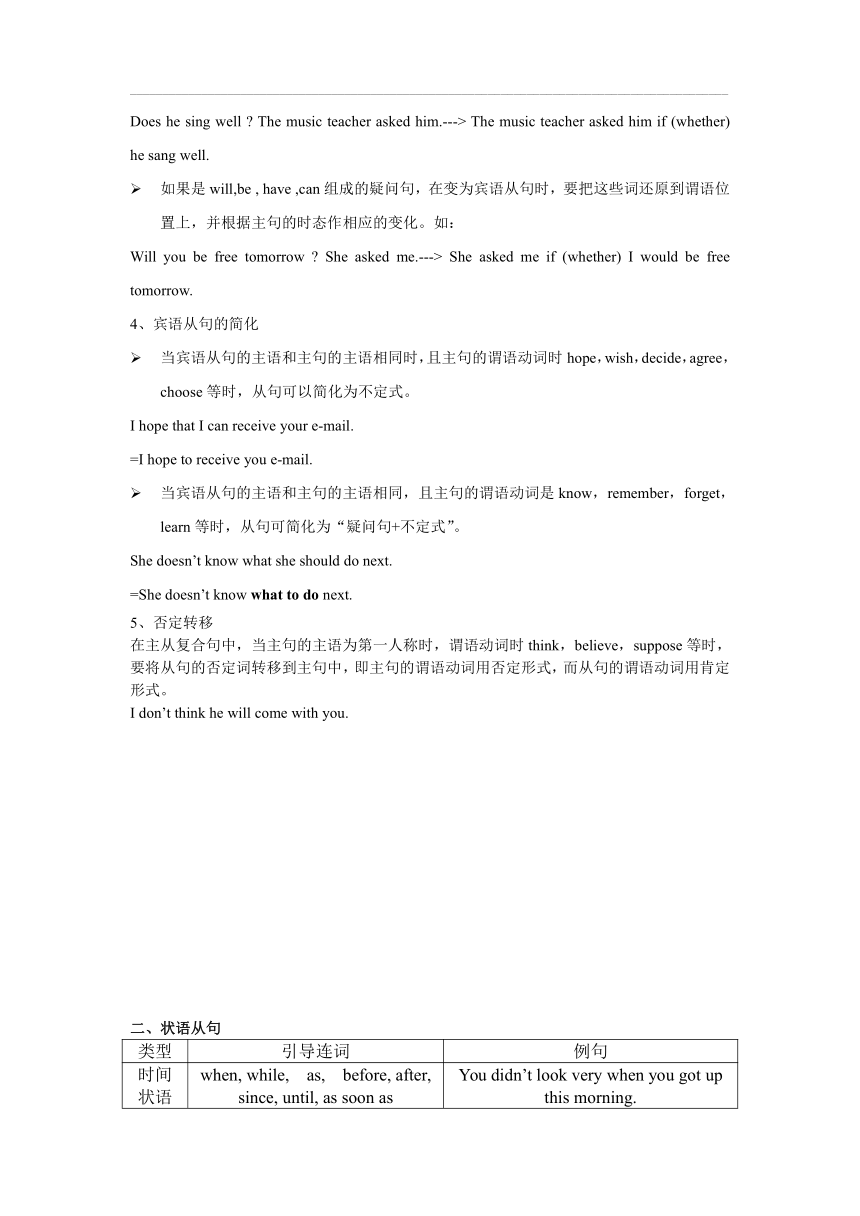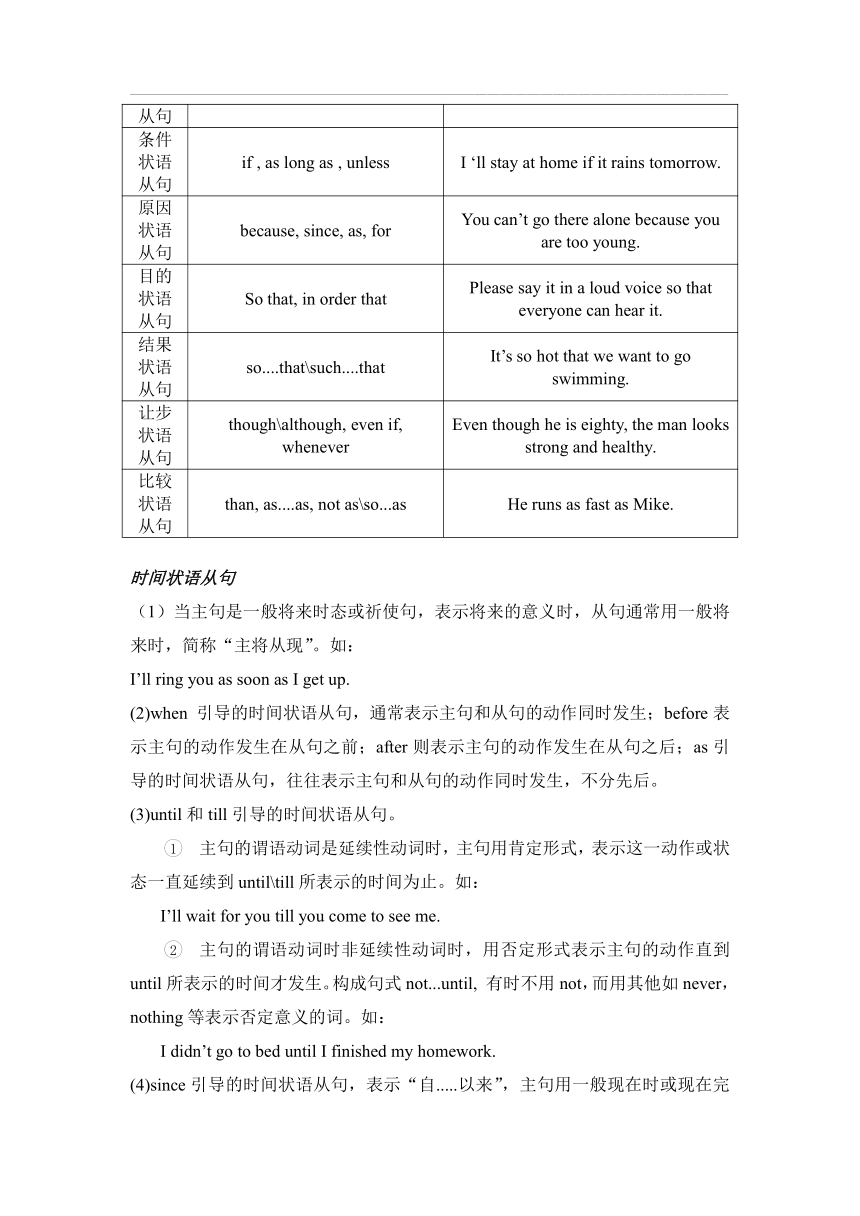初中英语素材-语法复合句
图片预览



文档简介
____________________________________________________________________________________________
初中英语语法---复合句
本部分内容是中考中必考及常考考点。
考点详解:
从句的概念:一个句子在另一个句子中充当成分,充当什么成分就做什么状语。
宾语从句
宾语从句的引导词
宾语从句是陈述句时,常用that引导,that无意义,在口语中和非正式与中常省略。如:
The
teacher
tells
us
(that)
we
will
have
an
English
test
tomorrow.
如果宾语从句由一般疑问句转换而来,其引导词用if或whether。一般情况下,二者可以通用,但从句中有or
not或从句充当介词的宾语时,只用whether。如:
I
don’t
know
if\whether
she
will
come
here.
Sorry,
I
don’t
know
whether
he
will
come
or
not
宾语从句是特殊疑问词时,引导词就是特殊疑问词。如:
Could
you
tell
me
where
the
post
office
is
?
The
teacher
asked
the
students
what
they
were
doing.
宾语从句的时态
主句的时态是一般现在时,从句的谓语动词的时态要根据具体的情况用相应的任何时态。如:
Do
you
know
who
was
talking
with
at
8
o’clock
last
night?
主句的时态为一般过去时,从句的谓语动词要用相应的某一过去时态。如:
He
told
me
that
he
had
been
to
England
twice.
从句表示的是客观真理、普遍现象,自然现象时,从句的时态一律使用一般现在时。如
She
said
the
sun
rises
in
the
east.
宾语从句的语序
在含有宾语从句的复合句中,宾语从句要使用陈述句语序,“引导词+主语+谓语+其他”。如:
I
want
to
know
when
the
train
left.
由do,does,did构成的疑问句,在装换成宾语从句时,要去电do,does,did,且从句中的谓语动词要根据主句时态作出相应的变化。如:
Does
he
sing
well
?
The
music
teacher
asked
him.--->
The
music
teacher
asked
him
if
(whether)
he
sang
well.
如果是will,be
,
have
,can组成的疑问句,在变为宾语从句时,要把这些词还原到谓语位置上,并根据主句的时态作相应的变化。如:
Will
you
be
free
tomorrow
?
She
asked
me.--->
She
asked
me
if
(whether)
I
would
be
free
tomorrow.
宾语从句的简化
当宾语从句的主语和主句的主语相同时,且主句的谓语动词时hope,wish,decide,agree,choose等时,从句可以简化为不定式。
I
hope
that
I
can
receive
your
e-mail.
=I
hope
to
receive
you
e-mail.
当宾语从句的主语和主句的主语相同,且主句的谓语动词是know,remember,forget,learn等时,从句可简化为“疑问句+不定式”。
She
doesn’t
know
what
she
should
do
next.
=She
doesn’t
know
what
to
do
next.
否定转移
在主从复合句中,当主句的主语为第一人称时,谓语动词时think,believe,suppose等时,要将从句的否定词转移到主句中,即主句的谓语动词用否定形式,而从句的谓语动词用肯定形式。
I
don’t
think
he
will
come
with
you.
状语从句
类型
引导连词
例句
时间状语从句
when,
while,
as,
before,
after,
since,
until,
as
soon
as
You
didn’t
look
very
when
you
got
up
this
morning.
条件状语从句
if
,
as
long
as
,
unless
I
‘ll
stay
at
home
if
it
rains
tomorrow.
原因状语从句
because,
since,
as,
for
You
can’t
go
there
alone
because
you
are
too
young.
目的状语从句
So
that,
in
order
that
Please
say
it
in
a
loud
voice
so
that
everyone
can
hear
it.
结果状语从句
so....that\such....that
It’s
so
hot
that
we
want
to
go
swimming.
让步状语从句
though\although,
even
if,
whenever
Even
though
he
is
eighty,
the
man
looks
strong
and
healthy.
比较状语从句
than,
as....as,
not
as\so...as
He
runs
as
fast
as
Mike.
时间状语从句
当主句是一般将来时态或祈使句,表示将来的意义时,从句通常用一般将来时,简称“主将从现”。如:
I’ll
ring
you
as
soon
as
I
get
up.
when
引导的时间状语从句,通常表示主句和从句的动作同时发生;before表示主句的动作发生在从句之前;after则表示主句的动作发生在从句之后;as引导的时间状语从句,往往表示主句和从句的动作同时发生,不分先后。
until和till引导的时间状语从句。
主句的谓语动词是延续性动词时,主句用肯定形式,表示这一动作或状态一直延续到until\till所表示的时间为止。如:
I’ll
wait
for
you
till
you
come
to
see
me.
主句的谓语动词时非延续性动词时,用否定形式表示主句的动作直到until所表示的时间才发生。构成句式not...until,
有时不用not,而用其他如never,nothing等表示否定意义的词。如:
I
didn’t
go
to
bed
until
I
finished
my
homework.
since引导的时间状语从句,表示“自.....以来”,主句用一般现在时或现在完成时,从句用一般过去时。机构为:It
has
been...since+从句\It
is
....since+从句。如:
I
have
worked
in
this
school
since
I
graduated
from
Beijing
University.
It
is
10
years
since
I
began
to
study
English.
条件状语从句
主句为一般将来时,从句用一般现在时。如:
I’ll
visit
the
Great
Wall
if
it
doesn’t
rain
tomorrow.
如果if引导的条件状语从句所表示的前提或条件将来可以实现或正在进行,从句要用现在完成时或进行时,主句通常用将来时。如:
We
will
give
you
a
good
price
if
you
are
thinking
of
buying
it.
”祈使句+and\or+陈述句”中,祈使句在意义上相当于一个条件状语从句。如:
Use
your
head,
and
you’ll
find
a
way.
=If
you
use
your
head
,you’ll
find
a
way.
原因状语从句
原因状语从句通常用because、since、as引导。这三个词所表示的语气依次减弱,用why提问用because来回答。如:
I
did
that
because
she
told
me
.
如果状语从句所表示的原因是人们已知的事实,就要用since,而不用as或because。Since在这里的意思是“既然”。如:
Since
you
can’t
answer
the
question,
you
can
ask
someone
for
help.
目的状语从句
引导目的状语从句的词或词组有so
that,
in
order
that等,谓语中常含有may,might,can,could,will,would等情态动词。如:
He
must
get
up
early
so
that
he
can
go
to
work
on
time.
当从句主语与主句主语一致时,可用so
as
to,
in
order
to
.如:
He
worked
day
and
night
in
order
that
he
could
succeed.
=He
worked
day
and
night
in
order
to
succeed.
结果状语从句
由so...that,
such...that引导,其区别:
So+adj\adv+that
Such+a\an+(adj+)单数名词+that
Such+(adj+)复数名词+that
Such
+(adj+)不可数名词+that
So
+adj+a\an+单数名词+that
当名词前有many或much修饰时,用so而不用such。如:
She
is
such
a
lovely
girl
that
we
love
her
very
much.
=She
is
so
lovely
a
girl
that
we
love
her
very
much.
We
have
so
much
time
that
we
can
finish
the
work
very
well.
so...that
句型的否定形式可用简单句too...to或
not...enough
to代替。
The
peach
is
so
sour
that
we
can’t
eat
it.
=
The
peach
is
too
sour
to
eat.
=The
peach
is
not
sweet
enough
to
eat.
定语从句
含有定语从句的复合句的基本结构:先行词+关系词+定语从句。定语从句的关系词的作用:
关系词
作用
先行词
例句
that,
who,
whom
主语、宾语
人
The
foreigner
who
speaks
good
Chinese
is
from
Canada.
that,
which
主语、宾语
物
I
wanted
to
know
which
school
it
was
you
went
to
.
whose
宾语
人、物
We
don’t
like
the
boy
whose
father
is
a
manager.
when
状语
时间
I
still
remember
the
day
when
you
left
for
Beijing.
where
状语
地点
This
is
where
my
mother
works.
why
状语
原因
Could
you
explain
the
reason
why
you
were
late?
关系代词的用法
一般情况下,that既可指人又可指物,可以代替who,whom和which,在从句中作主语,表语或谓语动词的宾语,但不能放于介词后,作介词的宾语;which指物,在从句中作主语、表语或谓语动词及介词的宾语;who在从句中作主语、表语或宾语;whom在从句中宾语;whose在从句中作定语。如:
A
doctor
is
a
person
who
looks
after
people’s
health.
先行词
主语
谓语
宾语
定语从句修饰先行词
Who时关系代词,在丁定语从句中作主语。
下列情况中,先行词指物时,只能用that引导,不能用which:
先行词时all,little,much,none,everything,nothing等不定代词时。
Is
there
anything
(that)
you
don’t
understand?
Tom
told
his
mother
all
that
had
happened.
当先行词有the
only,the
very,the
last等修饰时。
This
is
the
only
book
that
I
can
find.
当序数词或形容词最高级修饰先行词时。
This
is
the
best
book
that
I
have
ever
read.
当先行词有only,all,any修饰时。
I
want
to
read
all
the
books
that
were
written
by
Lu
Xun.
当主句是以疑问句which开头的特殊疑问句时。
Which
is
the
hotel
that
you
like
best?
关系代词的省略。一般情况下that,which,whom作宾语时可以省略,但以下情况不能省略:
关系代词which,
whom在从句中作介词的宾语并且介词谓语关系代词前时,不能省略。
I’ll
never
forget
the
day
on
which
I
joined
the
club.
that,which,who在从句中作主语时,不能省略。
Who
is
the
boy
that
is
talking
with
our
teacher?
关系副词的用法
when表示时间,在定语从句中作时间状语。
I
still
remember
the
year
when
you
graduate
from
No.8
Middle
School.
why
表示原因,在定语从句中作原因状语,其先行词只有表示原因的reason一词。
We
don’t
know
the
reason
why
he
was
so
sad.
where表示地点,在定语从句中地点状语。
That
is
the
school
where
I
studied
three
years
ago.
This
is
the
factory
where
my
father
works.
先行词
地点状语
主语
谓语
定语从句修饰先行词
初中英语语法---复合句
本部分内容是中考中必考及常考考点。
考点详解:
从句的概念:一个句子在另一个句子中充当成分,充当什么成分就做什么状语。
宾语从句
宾语从句的引导词
宾语从句是陈述句时,常用that引导,that无意义,在口语中和非正式与中常省略。如:
The
teacher
tells
us
(that)
we
will
have
an
English
test
tomorrow.
如果宾语从句由一般疑问句转换而来,其引导词用if或whether。一般情况下,二者可以通用,但从句中有or
not或从句充当介词的宾语时,只用whether。如:
I
don’t
know
if\whether
she
will
come
here.
Sorry,
I
don’t
know
whether
he
will
come
or
not
宾语从句是特殊疑问词时,引导词就是特殊疑问词。如:
Could
you
tell
me
where
the
post
office
is
?
The
teacher
asked
the
students
what
they
were
doing.
宾语从句的时态
主句的时态是一般现在时,从句的谓语动词的时态要根据具体的情况用相应的任何时态。如:
Do
you
know
who
was
talking
with
at
8
o’clock
last
night?
主句的时态为一般过去时,从句的谓语动词要用相应的某一过去时态。如:
He
told
me
that
he
had
been
to
England
twice.
从句表示的是客观真理、普遍现象,自然现象时,从句的时态一律使用一般现在时。如
She
said
the
sun
rises
in
the
east.
宾语从句的语序
在含有宾语从句的复合句中,宾语从句要使用陈述句语序,“引导词+主语+谓语+其他”。如:
I
want
to
know
when
the
train
left.
由do,does,did构成的疑问句,在装换成宾语从句时,要去电do,does,did,且从句中的谓语动词要根据主句时态作出相应的变化。如:
Does
he
sing
well
?
The
music
teacher
asked
him.--->
The
music
teacher
asked
him
if
(whether)
he
sang
well.
如果是will,be
,
have
,can组成的疑问句,在变为宾语从句时,要把这些词还原到谓语位置上,并根据主句的时态作相应的变化。如:
Will
you
be
free
tomorrow
?
She
asked
me.--->
She
asked
me
if
(whether)
I
would
be
free
tomorrow.
宾语从句的简化
当宾语从句的主语和主句的主语相同时,且主句的谓语动词时hope,wish,decide,agree,choose等时,从句可以简化为不定式。
I
hope
that
I
can
receive
your
e-mail.
=I
hope
to
receive
you
e-mail.
当宾语从句的主语和主句的主语相同,且主句的谓语动词是know,remember,forget,learn等时,从句可简化为“疑问句+不定式”。
She
doesn’t
know
what
she
should
do
next.
=She
doesn’t
know
what
to
do
next.
否定转移
在主从复合句中,当主句的主语为第一人称时,谓语动词时think,believe,suppose等时,要将从句的否定词转移到主句中,即主句的谓语动词用否定形式,而从句的谓语动词用肯定形式。
I
don’t
think
he
will
come
with
you.
状语从句
类型
引导连词
例句
时间状语从句
when,
while,
as,
before,
after,
since,
until,
as
soon
as
You
didn’t
look
very
when
you
got
up
this
morning.
条件状语从句
if
,
as
long
as
,
unless
I
‘ll
stay
at
home
if
it
rains
tomorrow.
原因状语从句
because,
since,
as,
for
You
can’t
go
there
alone
because
you
are
too
young.
目的状语从句
So
that,
in
order
that
Please
say
it
in
a
loud
voice
so
that
everyone
can
hear
it.
结果状语从句
so....that\such....that
It’s
so
hot
that
we
want
to
go
swimming.
让步状语从句
though\although,
even
if,
whenever
Even
though
he
is
eighty,
the
man
looks
strong
and
healthy.
比较状语从句
than,
as....as,
not
as\so...as
He
runs
as
fast
as
Mike.
时间状语从句
当主句是一般将来时态或祈使句,表示将来的意义时,从句通常用一般将来时,简称“主将从现”。如:
I’ll
ring
you
as
soon
as
I
get
up.
when
引导的时间状语从句,通常表示主句和从句的动作同时发生;before表示主句的动作发生在从句之前;after则表示主句的动作发生在从句之后;as引导的时间状语从句,往往表示主句和从句的动作同时发生,不分先后。
until和till引导的时间状语从句。
主句的谓语动词是延续性动词时,主句用肯定形式,表示这一动作或状态一直延续到until\till所表示的时间为止。如:
I’ll
wait
for
you
till
you
come
to
see
me.
主句的谓语动词时非延续性动词时,用否定形式表示主句的动作直到until所表示的时间才发生。构成句式not...until,
有时不用not,而用其他如never,nothing等表示否定意义的词。如:
I
didn’t
go
to
bed
until
I
finished
my
homework.
since引导的时间状语从句,表示“自.....以来”,主句用一般现在时或现在完成时,从句用一般过去时。机构为:It
has
been...since+从句\It
is
....since+从句。如:
I
have
worked
in
this
school
since
I
graduated
from
Beijing
University.
It
is
10
years
since
I
began
to
study
English.
条件状语从句
主句为一般将来时,从句用一般现在时。如:
I’ll
visit
the
Great
Wall
if
it
doesn’t
rain
tomorrow.
如果if引导的条件状语从句所表示的前提或条件将来可以实现或正在进行,从句要用现在完成时或进行时,主句通常用将来时。如:
We
will
give
you
a
good
price
if
you
are
thinking
of
buying
it.
”祈使句+and\or+陈述句”中,祈使句在意义上相当于一个条件状语从句。如:
Use
your
head,
and
you’ll
find
a
way.
=If
you
use
your
head
,you’ll
find
a
way.
原因状语从句
原因状语从句通常用because、since、as引导。这三个词所表示的语气依次减弱,用why提问用because来回答。如:
I
did
that
because
she
told
me
.
如果状语从句所表示的原因是人们已知的事实,就要用since,而不用as或because。Since在这里的意思是“既然”。如:
Since
you
can’t
answer
the
question,
you
can
ask
someone
for
help.
目的状语从句
引导目的状语从句的词或词组有so
that,
in
order
that等,谓语中常含有may,might,can,could,will,would等情态动词。如:
He
must
get
up
early
so
that
he
can
go
to
work
on
time.
当从句主语与主句主语一致时,可用so
as
to,
in
order
to
.如:
He
worked
day
and
night
in
order
that
he
could
succeed.
=He
worked
day
and
night
in
order
to
succeed.
结果状语从句
由so...that,
such...that引导,其区别:
So+adj\adv+that
Such+a\an+(adj+)单数名词+that
Such+(adj+)复数名词+that
Such
+(adj+)不可数名词+that
So
+adj+a\an+单数名词+that
当名词前有many或much修饰时,用so而不用such。如:
She
is
such
a
lovely
girl
that
we
love
her
very
much.
=She
is
so
lovely
a
girl
that
we
love
her
very
much.
We
have
so
much
time
that
we
can
finish
the
work
very
well.
so...that
句型的否定形式可用简单句too...to或
not...enough
to代替。
The
peach
is
so
sour
that
we
can’t
eat
it.
=
The
peach
is
too
sour
to
eat.
=The
peach
is
not
sweet
enough
to
eat.
定语从句
含有定语从句的复合句的基本结构:先行词+关系词+定语从句。定语从句的关系词的作用:
关系词
作用
先行词
例句
that,
who,
whom
主语、宾语
人
The
foreigner
who
speaks
good
Chinese
is
from
Canada.
that,
which
主语、宾语
物
I
wanted
to
know
which
school
it
was
you
went
to
.
whose
宾语
人、物
We
don’t
like
the
boy
whose
father
is
a
manager.
when
状语
时间
I
still
remember
the
day
when
you
left
for
Beijing.
where
状语
地点
This
is
where
my
mother
works.
why
状语
原因
Could
you
explain
the
reason
why
you
were
late?
关系代词的用法
一般情况下,that既可指人又可指物,可以代替who,whom和which,在从句中作主语,表语或谓语动词的宾语,但不能放于介词后,作介词的宾语;which指物,在从句中作主语、表语或谓语动词及介词的宾语;who在从句中作主语、表语或宾语;whom在从句中宾语;whose在从句中作定语。如:
A
doctor
is
a
person
who
looks
after
people’s
health.
先行词
主语
谓语
宾语
定语从句修饰先行词
Who时关系代词,在丁定语从句中作主语。
下列情况中,先行词指物时,只能用that引导,不能用which:
先行词时all,little,much,none,everything,nothing等不定代词时。
Is
there
anything
(that)
you
don’t
understand?
Tom
told
his
mother
all
that
had
happened.
当先行词有the
only,the
very,the
last等修饰时。
This
is
the
only
book
that
I
can
find.
当序数词或形容词最高级修饰先行词时。
This
is
the
best
book
that
I
have
ever
read.
当先行词有only,all,any修饰时。
I
want
to
read
all
the
books
that
were
written
by
Lu
Xun.
当主句是以疑问句which开头的特殊疑问句时。
Which
is
the
hotel
that
you
like
best?
关系代词的省略。一般情况下that,which,whom作宾语时可以省略,但以下情况不能省略:
关系代词which,
whom在从句中作介词的宾语并且介词谓语关系代词前时,不能省略。
I’ll
never
forget
the
day
on
which
I
joined
the
club.
that,which,who在从句中作主语时,不能省略。
Who
is
the
boy
that
is
talking
with
our
teacher?
关系副词的用法
when表示时间,在定语从句中作时间状语。
I
still
remember
the
year
when
you
graduate
from
No.8
Middle
School.
why
表示原因,在定语从句中作原因状语,其先行词只有表示原因的reason一词。
We
don’t
know
the
reason
why
he
was
so
sad.
where表示地点,在定语从句中地点状语。
That
is
the
school
where
I
studied
three
years
ago.
This
is
the
factory
where
my
father
works.
先行词
地点状语
主语
谓语
定语从句修饰先行词
同课章节目录
- 词法
- 名词
- 动词和动词短语
- 动词语态
- 动词时态
- 助动词和情态动词
- 非谓语动词
- 冠词
- 代词
- 数词和量词
- 形容词副词及其比较等级
- 介词和介词短语
- 连词和感叹词
- 构词法
- 相似、相近词比较
- 句法
- 陈述句
- 一般疑问句和否定疑问句
- 特殊疑问句及选择疑问句
- 反意疑问句
- 存在句(There be句型)
- 宾语从句
- 定语从句
- 状语从句
- 主谓一致问题
- 简单句
- 并列句
- 复合句
- 主谓一致
- 主、表语从句
- 名词性从句
- 直接引语和间接引语
- 虚拟语气
- 感叹句
- 强调句
- 倒装句
- 祈使句
- 句子的成分
- 句子的分类
- 题型专区
- 单项选择部分
- 易错题
- 完形填空
- 阅读理解
- 词汇练习
- 听说训练
- 句型转换
- 补全对话
- 短文改错
- 翻译
- 书面表达
- 任务型阅读
- 语法填空
- 其他资料
